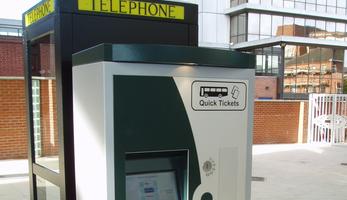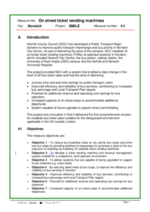Roadside ticket vending machines
Thematic areas
Collective passenger transport & shared mobility
- Ride sharing
- Car sharing
- Bike sharing
- Intermodality
- Service improvements
Summary
The measure focused on the delivery of innovative solutions for roadside ticket sales in order to prevent delays at the city’s bus stops.
Implementing sustainable mobility
Traditionally, the majority of passengers using bus services in Norwich, as in many UK cities, purchased their ticket from the driver on boarding the vehicle. However, the operation of driver-only buses had resulted in longer stopping times at bus stops, causing delays to the schedule and traffic congestion in the vicinity of bus stops, with a resulting negative impact on air quality. Delays had been compounded by the introduction of a wider range of ticket types.
The measure therefore comprised the installation of roadside ticket vending machines with networked communication links to remote monitoring and revenue management systems. The vending machines were designed to offer the full range of single, return and day tickets for travel within the greater Norwich area and destinations beyond. Customers would be able to choose between different operators and tariffs when buying their ticket, and the machines would accept cash and give change. They would also be capable of accepting bank notes and potentially bank cards.
The plan was to install 16 vending machines at locations throughout the city, including the bus station, the railway station, the university and the hospital. The servers for remote monitoring and revenue management would be located at County Hall.
Progress
All 16 state-of-the-art touch-screen ticket machines were purchased from a German company. The machines can handle a variety of fare structures and tariffs, can accept payment by coins or notes, and can give change. The machines were installed in two phases in 2005 and 2006. Training was then provided in cash collection and machine maintenance, and in the use of the central management system.
Outcomes
The machines have generally performed reliably and their use has increased steadily since they were installed. There was a 15 percent increase in monthly ticket sales from January to December 2007. Awareness of the machines greatly exceeds their use: for example, while 52 percent of people interviewed at the hospital were aware of the machines, only 8 percent had actually used them. There was a big variation in the use of the machines at different sites: the most popular machines sold 1,000 tickets per month, while the least used sold between 50 and 100 tickets per month, suggesting the importance of identifying the most appropriate location for the machines.









